Coffee Culture | Coffee Development in China and Japan
For professional baristas, please follow the coffee workshop (Wechat official account cafe_style)
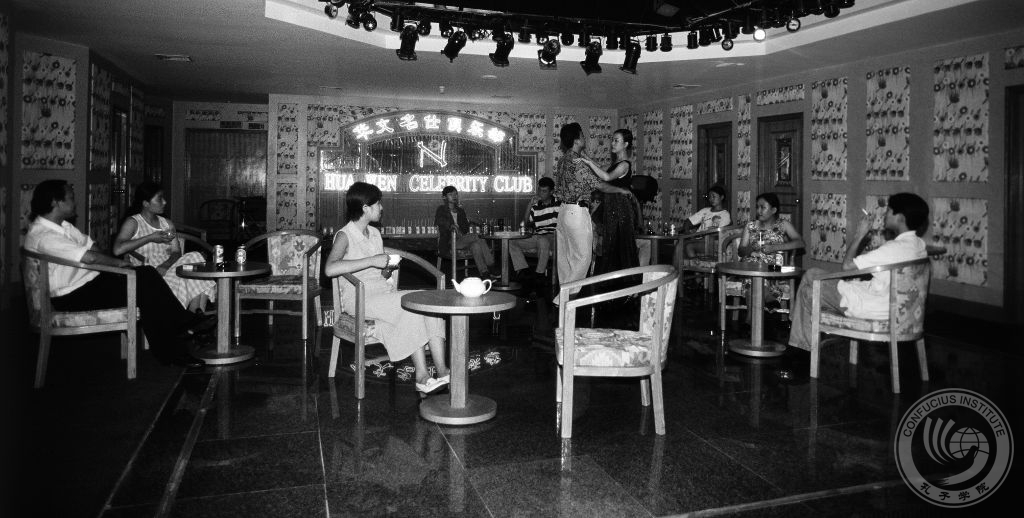
Interior view of a coffee shop in Dongcheng, Beijing, 1994.
Coffee was first recorded in Chinese history books when the first coffee tree was planted in Taiwan in 1884. In the tenth year of Guang Xu of the Qing Dynasty (AD 1884), an English tea merchant found that the climate of Taiwan was very similar to that of South America, so it should be a good place to grow coffee. As a result, 100 Arabian coffee trees were introduced to Taiwan, thus becoming the "ancestor" of Chinese coffee. The earliest coffee cultivation in the mainland began in Yunnan in the early 20th century, when a French missionary brought the first coffee seedlings to Binchuan County, Yunnan Province. Now China's Guangdong, Guangxi, Yunnan, Taiwan, Fujian and other places have introduced coffee trees more than a hundred years ago, this is the so-called "Chinese coffee" Chinese coffee).
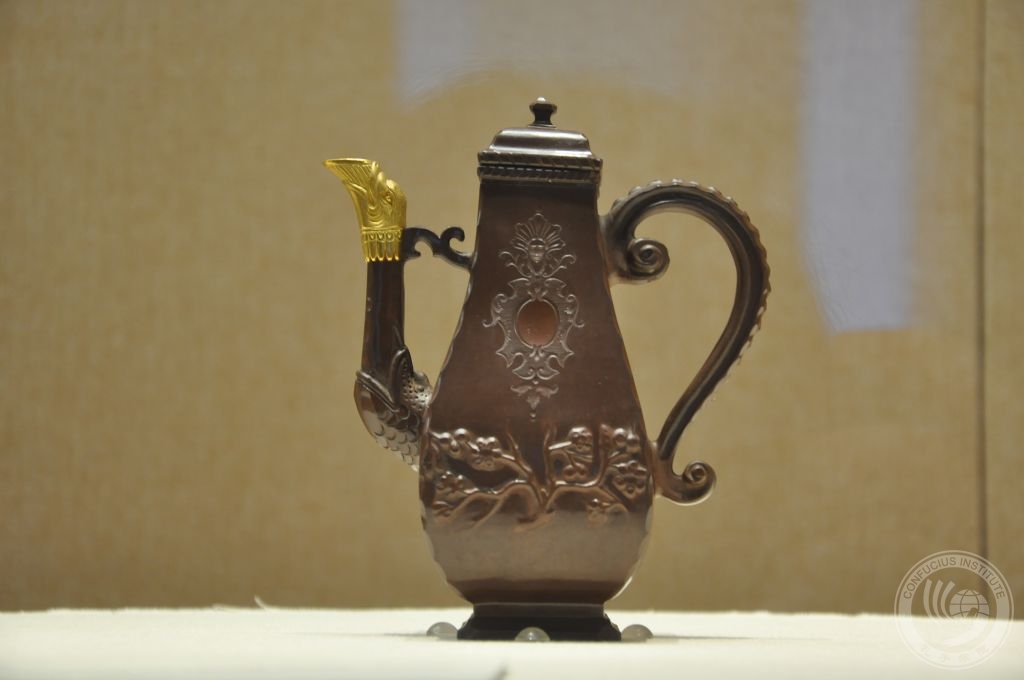
Imitation Yixing decal coffee pot, made in Germany. On November 17, 2012, Guangdong Museum "Exhibition of Guangdong, Hong Kong and Macao Cultural relics on Sea porcelain Road".
In terms of natural planting conditions, most parts of southern China are very suitable for coffee cultivation, but in China, which has a history of tea culture for thousands of years, coffee has not caused much response for a long time when it was introduced into China. The development of coffee culture in China has experienced a tortuous evolution process.
Cafes are mysterious and noble.
At first, coffee was able to enter the lives of ordinary Chinese people, mainly because famous coffee companies such as Nestle and Maxwell entered the Chinese market, which purchased coffee beans from Chinese growing areas and sold finished coffee. it is weakly and slowly promoting the development of Chinese coffee culture. For a long time, the coffee that the average Chinese consumer understood was "instant coffee" drunk directly with hot water, and this bitter and sweet drink did not get much favor. It was not until international coffee giants such as Shangdao original coffee and Starbucks entered China that people began to realize that coffee is a delicate drink with a rich mellow flavor. Coffee seems to have become popular overnight. And the cafe, the kind of dim light, dark wooden tables and chairs, a stainless steel spoon with a thin handle in the coffee, a small pot of light milk, and a small packet of sugar in a small magnetic bucket. For the Chinese who have not really started the level of economic development in the early calendar of reform and opening up, it is mysterious and noble. This kind of drink full of western exotic flavor was once deified by the Chinese people. Once upon a time, coffee was the spokesman of petty bourgeoisie life in China, and cafes were regarded by many Chinese as high-end and luxurious places for consumption. It is true that the price of coffee in China was much higher than that in the West and Japan. Many people think that holding a cup of coffee is full of noble flavor in line with international standards.
Chinese people write a unique flavor of Chinese coffee culture.
Since the 1990s, with the increasing development of China's foreign exchanges, Western culture is no longer mysterious and untouchable to China. With the continuous development of China's economy, especially the growing ranks of the urban middle class, more and more people drink coffee, and the "coffee culture" begins to sneak into every corner of Chinese life. Coffee in China is gradually associated with fashion and modern life. Cafes and western restaurants all over the city have become good places for people to do business, leisure and even fall in love. The rich aroma of the carefully brewed hot coffee is intoxicating. Coffee culture has gradually become synonymous with fashion and elegance in China. With the natural attribute of coffee, the color of alienation still exists in China at this time. Whether it is deification or alienation, it all comes from ignorance. Entering the 21st century, China's economy is developing rapidly and highly internationalized, and the Chinese people who have greatly broadened their living standards and vision have been able to taste the charm of high-quality coffee. With the faster and faster pace of life and increasing work pressure, the refreshing effect of coffee has been paid more and more attention by the Chinese people. At this time, coffee, with its true color, has been integrated into Chinese life in all aspects, and has become a kind of leisure drink. Chinese people date, talk and be in a daze in cafes, and coffee consumption has become real daily consumption and emotional consumption. Some data show that China's coffee consumption is increasing year by year and is expected to become an important coffee consumer in the world. Now the local coffee produced in China, with its warm and mellow quality and low price, will promote this trend and become the Chinese people's own coffee brand. China, which has a profound cultural heritage, will write a unique coffee culture like Chinese tea culture after coffee culture has been deified and alienated.
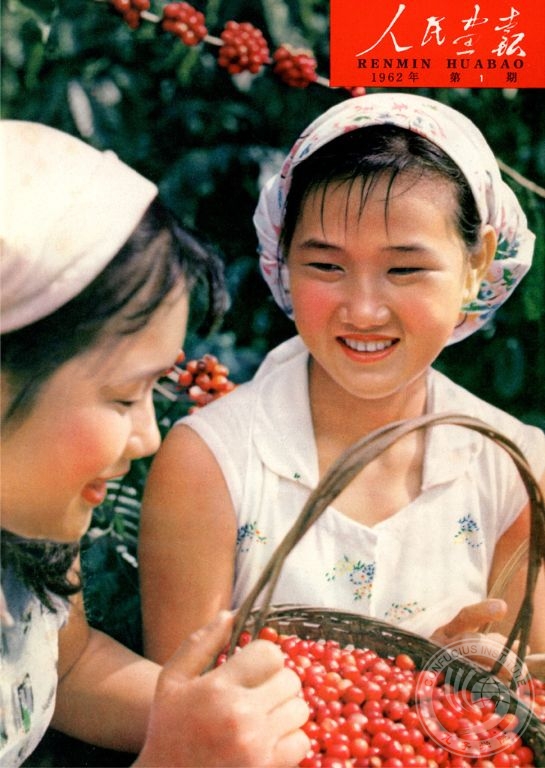
The cover of the first issue of the Chinese edition of people's Pictorial published in 1962: coffee is ripe.
So, what is the course of coffee in Japan, which is adjacent to China?
Japan is the third largest importer of coffee in the world, after the United States and Germany. The top coffee in the world is in Japan, and the most popular coffee in the world is also in Japan. The earliest bottled coffee was launched in Japan, and the charcoal-roasted coffee that swept the world was invented in Japan. Japan has a world-leading cold extraction process for coffee. Japan is also the only country in the world that has an official coffee festival. There are a lot of cafes in Japan, which are always full of customers. The Japanese drink coffee in the morning, at noon and even in the evening.
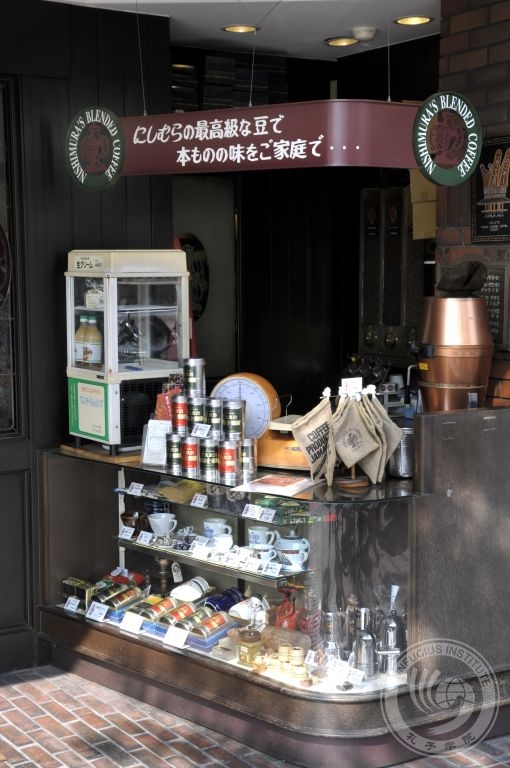
Coffee counter in front of Nishimura Cafe in Kobe, Japan.
This is such a surging love of coffee that it seems to be inborn. However, this is not the case.
Coffee first entered Japan around 1630 and was brought by Dutch missionaries and merchants. It also happened to be a time when coffee houses were springing up all over Western Europe. It can be described as a prosperous period of coffee culture in the world. But the Japanese can't accept this weird drink at all. At that time, Japan was in the midst of the strict closed-door policy of the Edo era. they inherited the tea culture derived from China and tasted the soft and peaceful life in the light and meaningful green tea. When the first Dutch missionary who landed in Nagasaki, Japan, brought the first cup of coffee, it was vomited by the Japanese for the first time. They think it's like a potion.
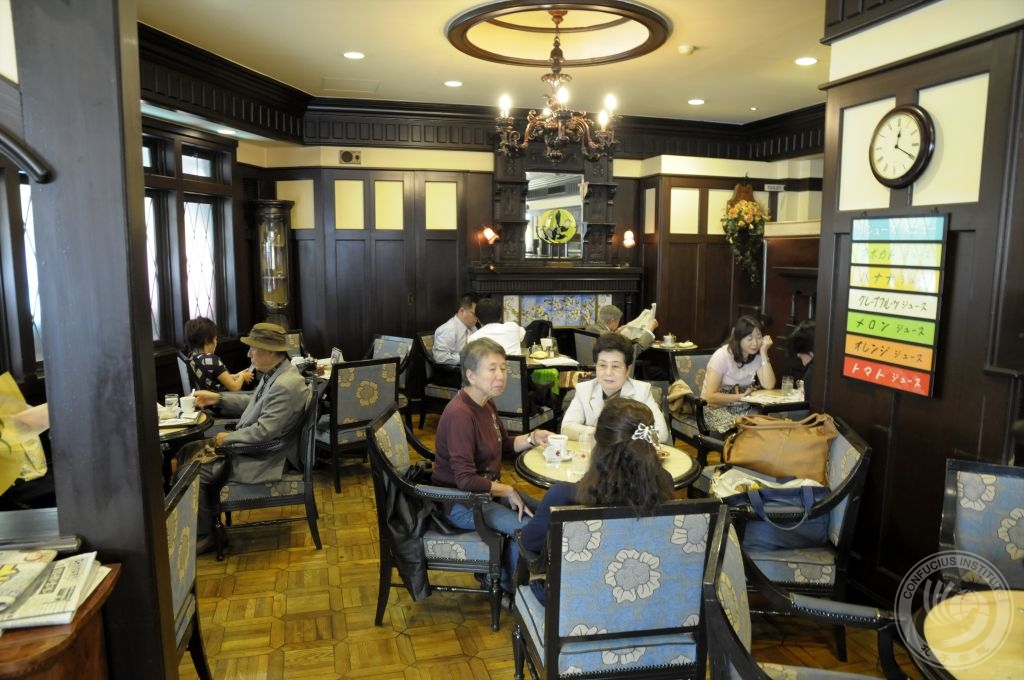
Kobe citizens in Japan enjoy coffee leisurely in a retro-style cafe.
Until the Meiji Restoration, Japan ended the policy of locking up the country, and Japanese society set off the trend of "Western learning". While gradually accepting Western industrial civilization, people began to try to accept their way of life, including coffee. At first, coffee first appeared in hotels where Japanese foreign envoys stayed, playing the role of a "diplomatic drink". Then, with the help of the power of the cultural movement, coffee became popular among intellectuals, so as to enter the life of Japanese upper-class society and become a "high-end drink". Then it spread to the general public. In this process, in Japan, which is famous for the tea ceremony, there have been many attacks on the coffee culture, criticizing the Japanese for fawning on foreigners, abandoning sake for beer, abandoning the tea ceremony for coffee.
But compared with the solemn tea ceremony, the free and casual cafe is obviously very popular with young people. Therefore, after opening the door and opening the mind, coffee has quickly become a hot popular drink. Since the 1990s, cafes have gradually become a unique scenery on the streets of Japanese cities, and going to cafes has become a part of the life of young people in Japan.
Of course, the Japanese strong spirit of research and innovation determines that Japanese coffee culture is not the transplant of western coffee culture, but more of the collision and fusion of multinational cultural elements. At that time, Japan, like a sponge, had a strong ability to absorb and digest multiculturalism, and localized foreign cultures through its own creation. Coffee culture is an excellent example. For example, through a variety of mash-up improvements, the Japanese have created iced coffee, matcha coffee, sundae coffee, flower coffee and so on, which are beyond the imagination of the country of origin of coffee. For example, the charcoal-roasted coffee mentioned above is an improvement of the roasting method of coffee by the Japanese. The coffee baked with charcoal fire is mellow and deep in color. There is also the best coffee-Blue Mountain, a luxury coffee known as "coffee beauty", which was almost monopolized by Japan half a century ago.
Influenced and inspired by European and American culture, we seek a breakthrough-- to integrate imported culture and make it localized-- to make it go to the extreme through diversified development. This is probably the process of the development of coffee culture in Japan, striving for excellence, comprehension and self-achievement, which is the creative spirit worthy of respect in Japan.
The March 11 East Japan earthquake in 2011 shut down many coffee shops in the disaster area, and the coffee shops that reopened immediately filled with customers. I can finally get some coffee. This sentence can really make the world reborn after the disaster full of hope. Perhaps, in Japan, coffee itself is a force of life.
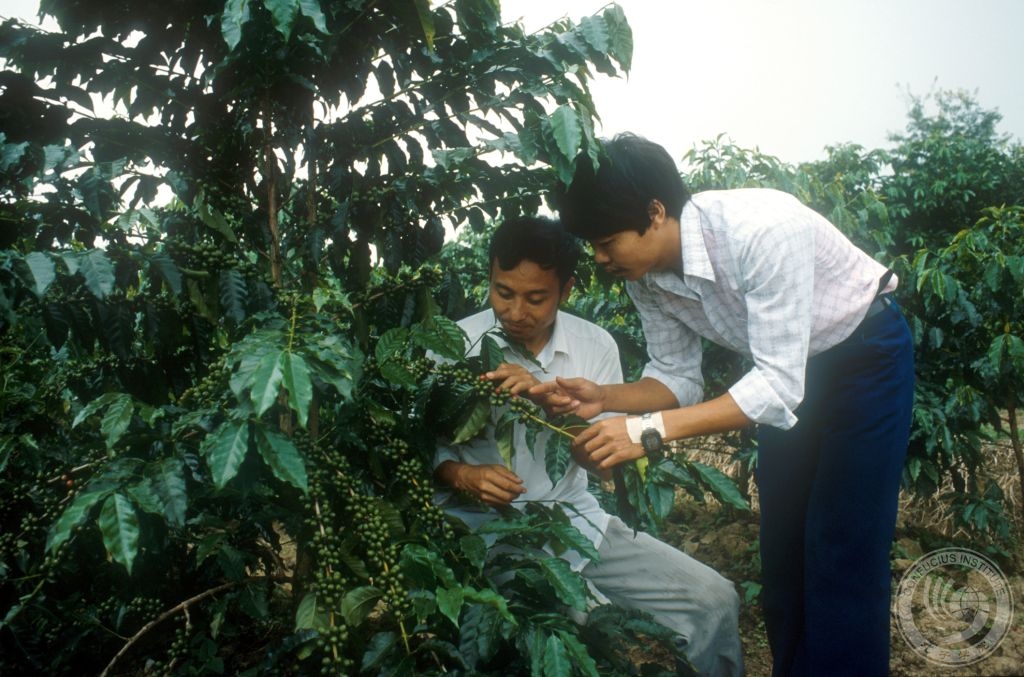
The large-scale planting of coffee trees in Yunnan Province began in the mid-1950s, and by the end of 1997, the planting area of coffee in the province has reached 7800 hectares. At present, the planting area of the province accounts for 70% of the national area, and the output accounts for 83% of the country. Whether it is the planting area or the output of coffee beans, Yunnan coffee has established its leading position in China. The picture on the left was taken at the Coffee Garden in Mangshi, Yunnan Province in 1984.
Important Notice :
前街咖啡 FrontStreet Coffee has moved to new addredd:
FrontStreet Coffee Address: 315,Donghua East Road,GuangZhou
Tel:020 38364473
- Prev

Extraction technique and time practical parameters of siphon Yega Fischer, Ethiopia
For professional baristas, please pay attention to the siphon pot in the coffee workshop (Wechat official account cafe_style), which is easy to operate, widely loved by the public, and can make simple good coffee without destroying the original flavor of the coffee. first of all, understand the basic operation of the siphon pot: siphon cooking is as follows: for example, Ethiopia Yega Snow Fischer classification: G1 varieties:
- Next

Bhakti: "There is no way, there is no way, everything is fine, everything is fine." "
Yes or no, whatever. Do not rejoice in things, do not grieve for yourself. Everything goes with fate. Recently, the concept of Buddhism has been talked about everywhere. The Internet hot word Buddhism has arisen among young people, expressing a so-called mentality of everything following fate. Before, pull flowers always crooked, practice every day, milk also consumed several boxes, now, with fate, crooked, crooked, not right
Related
- How did the Salvadoran coffee industry develop in Central America?
- What exactly does the golden cup extraction of coffee mean?
- The Origin of Coffee flower
- [2023 Starbucks World Earth Day] there are more meaningful things besides free Starbucks coffee!
- What kind of coffee is there in Spain? 9 Flavors of Spanish Coffee
- Aromatic African coffee| Kenya's coffee culture and historical production area
- Liberica Coffee Bean knowledge: the characteristics of Liberian Coffee beans of the three original species of Coffee beans
- The origin and formula of Spanish latte introduces the taste characteristics of Bombon coffee in Valencia, Spain.
- How to adjust the solution of over-extracted coffee
- What is the tasting period of coffee beans? What is the period of coffee and beans? How should coffee wake up and raise beans?

